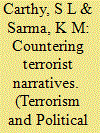| Srl | Item |
| 1 |
ID:
191002


|
|
|
|
|
| Summary/Abstract |
This study presents the findings of a laboratory-based experiment testing hypothesised processes implicated in the prevention of violent radicalisation through counter-narratives. The central aims of the study were to contribute to counter-narrative theory, whilst highlighting the value of experimental methodologies that can be deployed in this area of scientific enquiry. Two counter-narrative strategies were evaluated against a dominant terrorist narrative. Considering the role of cognition in the processing of narrative-related information, participants’ (n = 150) Cognitive Reflection and Need for Cognition were measured before they were randomly assigned to a narrative that legitimized terrorist violence, one of two counter-narratives, or a control. Returning autonomy to the target by having them actively counter terrorist rhetoric themselves was found to be more effective than offering generic counter-narratives. Notwithstanding the challenges and limitations associated with measuring violent radicalization-related constructs, the findings of the experiment demonstrate the extent to which individuals vary in their susceptibility to violent, terrorist narratives, as well as attempts to counter them.
|
|
|
|
|
|
|
|
|
|
|
|
|
|
|
|
| 2 |
ID:
188030


|
|
|
|
|
| Summary/Abstract |
Research in several domains has shown that attitudinal inoculation effectively promotes resistance to persuasion. Despite its proven efficacy, inoculation has not been empirically tested as a strategy for preventing the adoption of beliefs and attitudes consistent with violent extremist ideologies. The current study addresses this gap in the literature. In a between-subjects experiment performed in the U.S., participants (N = 357) were exposed to an inoculation message or no-inoculation control message before reading left- or right-wing extremist propaganda. Inoculation positively predicted psychological reactance, which in turn, reduced intention to support the extremist group. Inoculation also negatively predicted perceptions of the extremist group’s credibility, which positively predicted support intention. Neither the apparent source of the inoculation message, nor the ideological focus of the propaganda, moderated any of these relationships. These results effectively extend the scope of inoculation theory into the realm of violent extremism and have implications for the development of messages intended to prevent persuasive outcomes consistent with extremist ideologies.
|
|
|
|
|
|
|
|
|
|
|
|
|
|
|
|